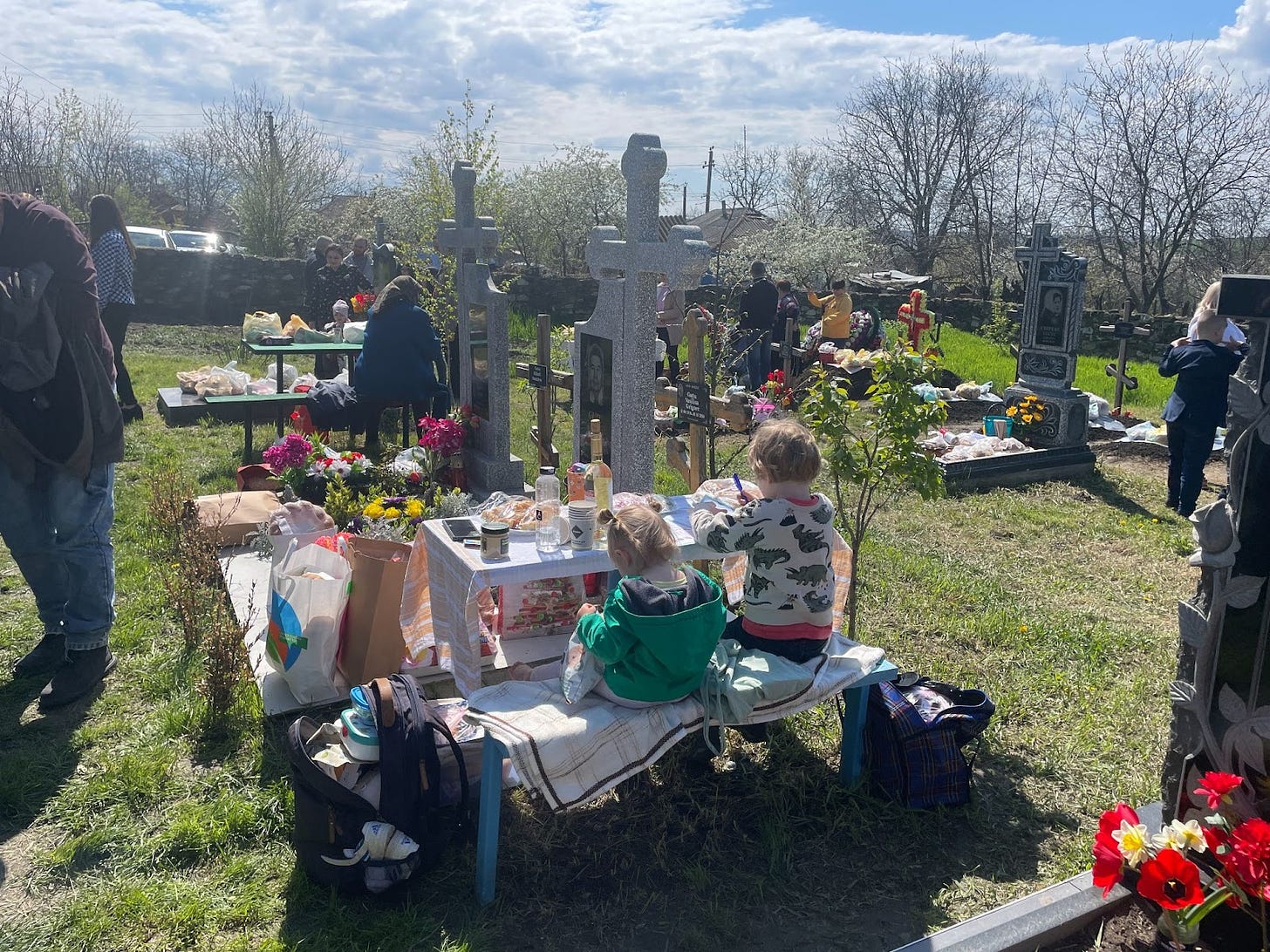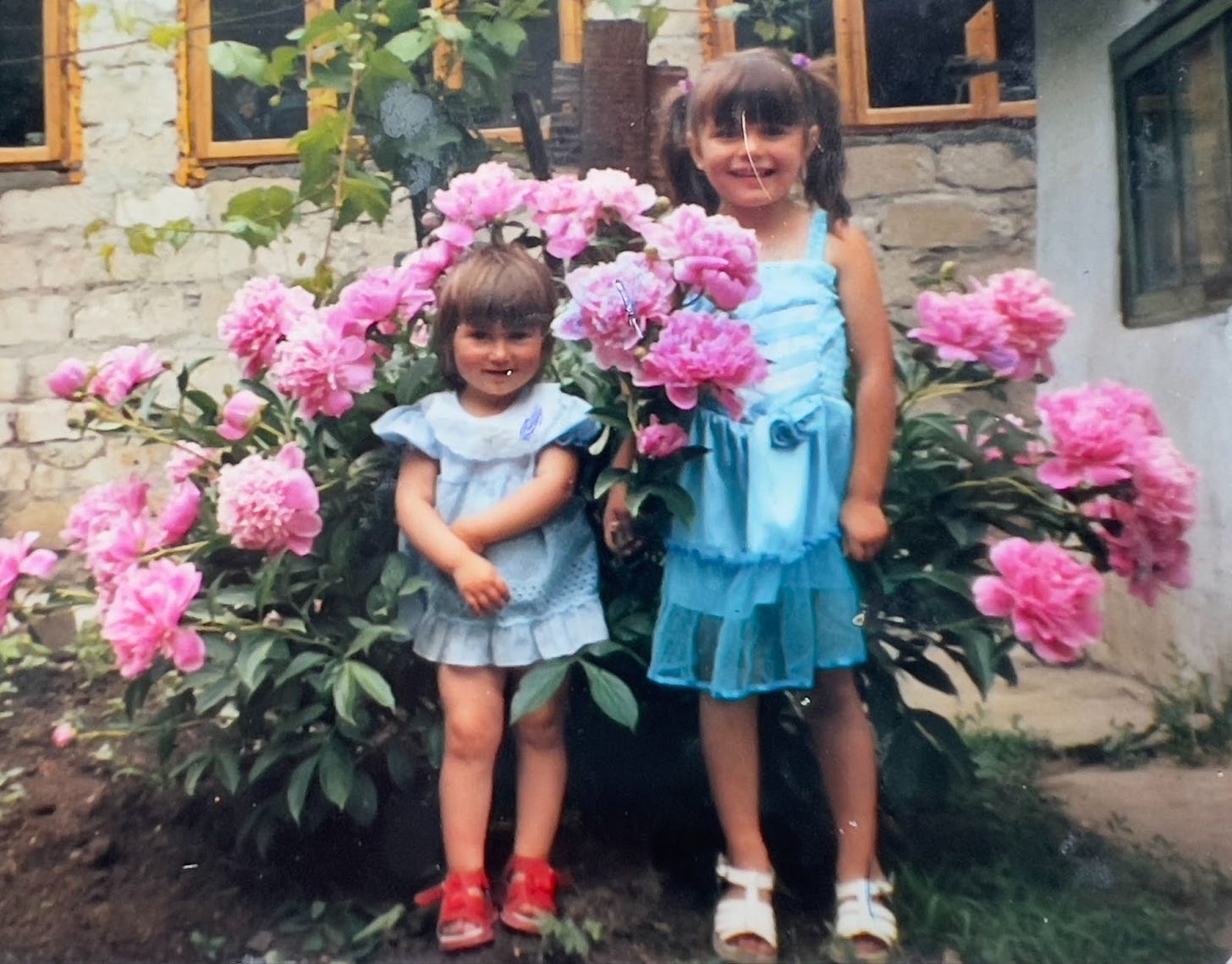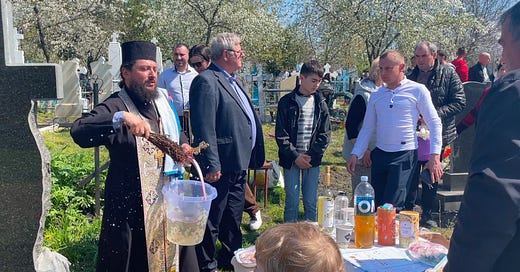My childhood memories from the Easter of the Dead
Guest Essay, Journo Birds, May 16, 2024
Welcome back to Moldova Matters! This article is written as a guest essay by Elena Vrabie of the Journo Birds team. Moldova Matters is collaborating with this team of journalists to share their stories about Moldovan culture and life. You can follow Journo Birds directly on Instagram, Facebook, YouTube or their website.

At the beginning of this week, Moldova celebrated the 'most Moldovan tradition' - the Easter of the Dead. It still has its charm for young Moldovans, too.
I'm a 23-year-old Moldovan. I grew up in a small town in southern Moldova. Orthodox Easter is the most important celebration for Moldovans. Eight days later, typically on a Monday, the whole village comes together to celebrate in a cemetery.
About 90 percent of Moldovans are Orthodox Christians, a statistic I once belonged to before moving to the capital, Chisinau, as many young people do. Then I started to rethink.
I noticed how we Moldovans pay significant attention to religious details and traditions.
But in my daily life experience, we don't talk a lot about Jesus and his presence. At times, it feels as though our focus on traditions overshadows the deeper essence of Orthodox Christianity.

Many people don’t go to church except for special celebrations. However, we still try to observe traditions like fasting in the spring, although nowadays, it often simply means eating less. Traditionally, you should only eat plant-based food for 40 days. During Easter, we prioritize attending church for confession to cleanse ourselves of sins. We clean, dye our eggs red, cook a lot, and receive a blessing for our food from the priest.
When I was little, my family made a concerted effort to uphold these traditions. I never questioned why we followed them; it was simply how things were done. I feared that I would be a bad person if I didn’t.
But over time, I felt like the traditions served as a sort of cover, proving to ourselves that we are religious and humble. I remembered more religious celebrations than actually contemplating the meaning of God.
The country celebrated the 'most Moldovan tradition' this week - Easter of the Dead or Memorial Easter. It is observed on the eighth day after Orthodox Easter, typically on a Monday.
For a visitor, it might seem like a grand cemetery party, something truly unique to Moldovan culture or even within Orthodox religion. Visiting relatives' graves in the spring seems more of a Slavic tradition, so other Slavic Orthodox countries have their similar celebrations. However, the Moldovan way could stand out even among them.
Food trucks with ice cream
Preparations for the day began long before its arrival. We cleaned and decorated the graves. Then, as true Moldovans, we embarked on a shopping trip for our beloved deceased. We brought clothes, socks, or dishes to the cemetery, all with the thought of our departed loved ones in mind.
These items adorn their graves, and if we leave food, it's believed that they will consume it in the afterlife. “This is for my dear one’s soul,” we say.
On the big day, food trucks parked in the lot, offering ice cream and other goodies. Today, the food trucks are gone, as there are fewer people in the villages. I remember we arrived at the cemetery with empty stomachs, ready to feast there. Each grave has a table and chairs for that.
People dressed in their finest clothes. We bathed. My mom made me and my sister hair braids. Women ironed their dresses and tied flowery scarfs around their heads. Some wore high heels. My dad took out his best shoes.
Before me and my sister were allowed to play with our friends, we helped our parents arrange the offerings for the dead (pomeni in Romanian) on the graves. Towels, plates, pijamas, socks, candy, depending on what the deceased person would have liked.
We ate meat patties, eggs, and white Easter bread. And then went to play hide and seek between the tombs.
Suddenly, a special song started. “Christ has risen from the dead,” the ladies, accompanying the priest, sang. The priest walked around, sprinkling holy water everywhere. He visited each grave and drew crosses in the air with a chalice of wine.
The offerings were then passed out to friends and relatives. They ease the grieving process, allowing us to accept the absence and find solace in the thought that they're at peace.
A ritual with pagan roots
Andrei Corobcean, a researcher from the State University of Moldova, suggests that Easter of the Dead is not a proper Christian ritual or canonical holiday, writes Moldova.org
Instead, it has roots in the old community's traditions. According to Corobcean, our Easter of the Dead has pre-Christian pagan origins that were assimilated by the church. “Here, Christianity penetrated slowly, combining with old pagan traditions related to polytheism, totemic objects, and other cults,” he describes. The Church had to tolerate them in order to attract communities to its side.
Corobcean elaborates on how dining with the dead is not a common practice today and is not rooted in Christian tradition. Instead, it reflects the collective memory of past community funeral feasts, transformed into a ceremony to honor ancestors.
Nowadays, it is also not considered sinful to bring a piece of bread to the cemetery. However, as explained by Priest Octavian Moșin in the same article, when cemetery visits involve meals, parties, and noise, they can cross the boundaries of common sense. He recommends spending the day in prayer or meditation, remembering the deceased within the family circle.
People still gather to celebrate in the cemeteries, albeit in a quieter manner than I remember from my childhood.
The first time I understood the true meaning of the Easter of the Dead is when my best friend and a few years later, my grandfather died. The games were replaced by sadness. Instead, I took time to think about the people who were no longer with me.
Thus, while this celebration may appear peculiar, it's meaningful. Reflecting on others' lives helps us become better individuals and guides us on our own life paths.
This is also what God means to me. It's not about fear of punishment, but about soul-searching and nurturing my well-being because when I feel good, I can do good. It's about taking responsibility for solving my problems rather than attributing them to God's will. After all, if I don't take responsibility for my own life, how can I effectively care for others?





